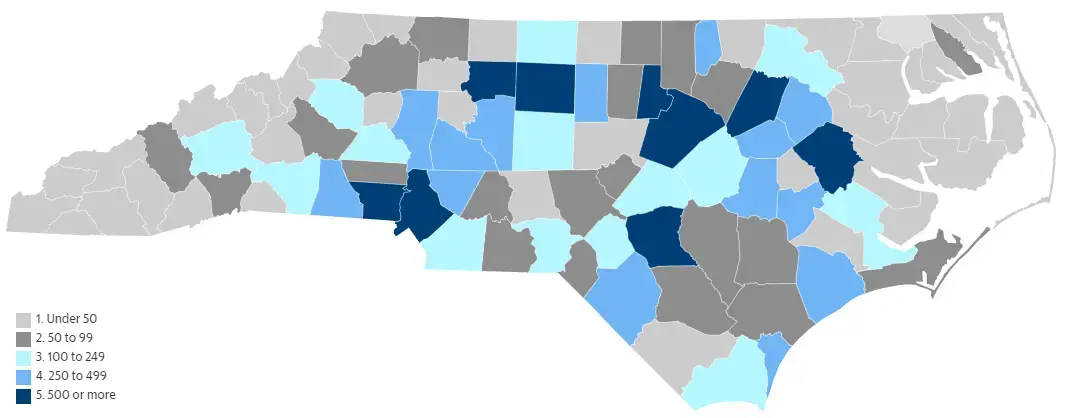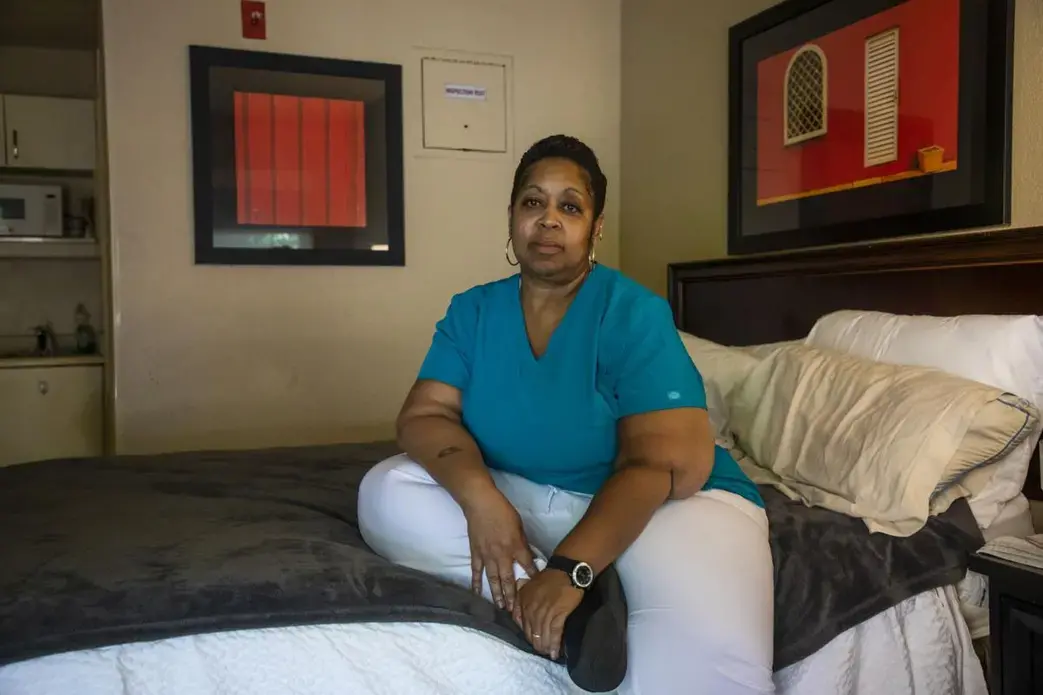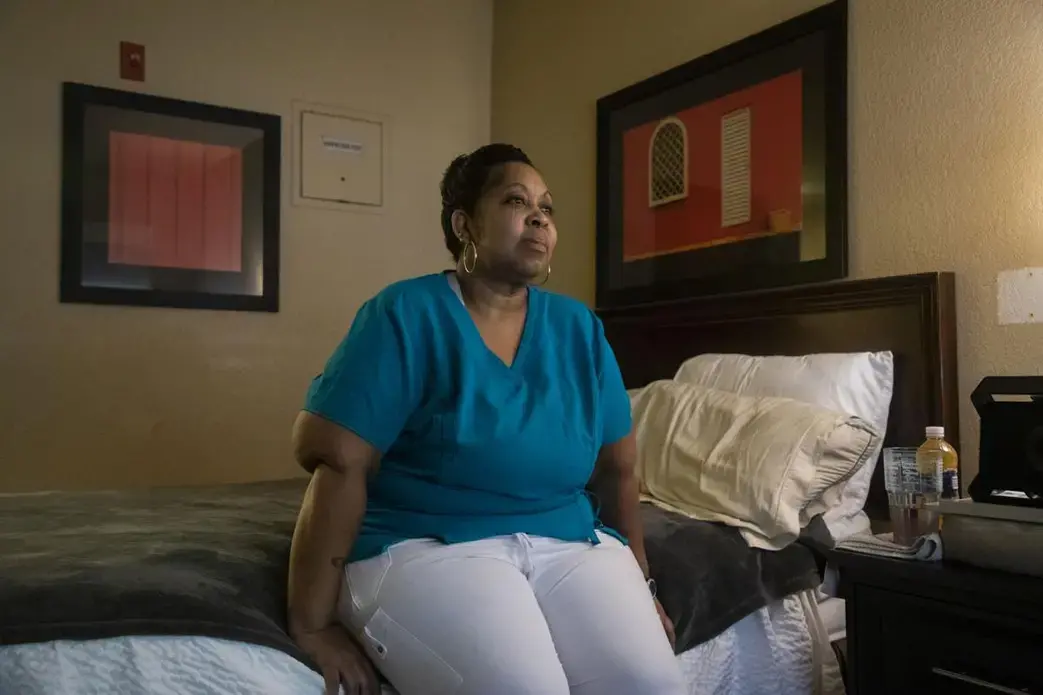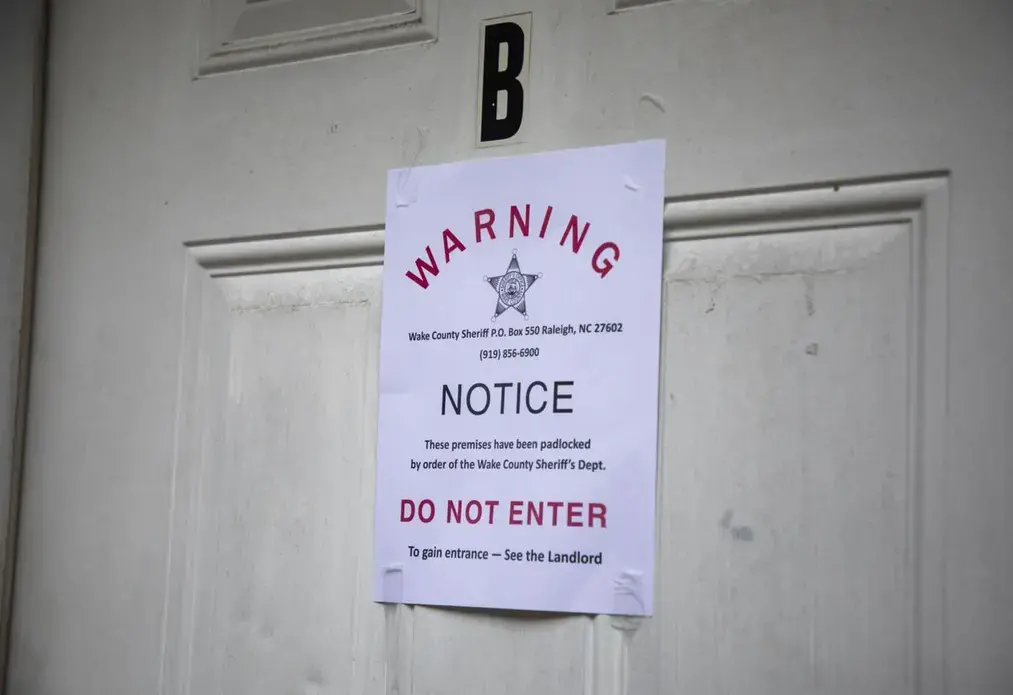Catrice Otengo parked her 2007 Ford Focus at an Extended Stay America in Greensboro, North Carolina, on an early July morning.
She just finished third shift as a specimen processor at Quest Diagnostics.
Inside her one-bed motel room, storage bins sat in the corner and a suitcase filled with clothes was tucked under a desk.
This was home.
The pandemic first brought a cut in Otengo’s hours. Then, a weeks-long furlough. Unemployment checks didn’t come quickly enough. An eviction did.
“I shouldn’t be here,” Otengo, 49, said. But she’s been living in this motel room since mid-July.
COVID-19 decimated America’s economy, leaving millions of tenants without the income they needed to make rent. Government officials tried to keep them sheltered. The state halted evictions at the start of the pandemic, through June 23. Then, at the start of September, the Centers for Disease Control and Prevention blocked evictions nationwide for renters affected by the virus.
But, in that roughly two-month gap, Otengo and others fell through the cracks.

Across the state, landlords filed evictions against more than 18,000 tenants in between moratoriums. It’s unclear how many people were displaced, but eviction filings doubled from June to July and continued that pace into August, according to an analysis of data provided by the state Administrative Office of the Courts.
Renters had no safety net for much of the summer. The North Carolina General Assembly failed to direct any COVID-19 relief funds to help tenants settle overdue rent. In late August, Gov. Roy Cooper directed $175 million in housing relief, but for renters already displaced, it was too late.
Housing advocates predict another deluge of evictions in January after the federal moratorium expires.
“You’re just essentially postponing those evictions from now until January,” said Jesse McCoy, supervising attorney at Duke University’s Civil Justice Clinic, which helps tenants facing eviction in Durham.
Under the CDC moratorium, renters must provide sworn statements that they can’t pay rent due to the virus and failed to find help elsewhere. Landlords could face criminal prosecution if they try to displace those tenants.
The CDC order couldn’t help Otengo. She said it made her sick to her stomach.
“What about the people that have already been evicted? What about those people? Where was my protection?” Otengo said.
Help Came Too Late
Right before the pandemic hit, a surgery put Otengo out of work for all of February, she said. Checks from her short-term disability insurance were slow to arrive.
She fell behind on her $765 monthly rent.
Otengo returned to work by the start of the pandemic. Soon, though, her hours were cut to 20 a week. In late April, Quest Diagnostics furloughed her, she said.
Like thousands of other workers, Otengo battled an overwhelmed unemployment system. She said only one check came.
With unpaid rent piling up month after month, Otengo drove to Raleigh in mid-June to protest alone at the offices of the North Carolina Division of Employment Security, the state agency that dispenses unemployment benefits.
A concerned DES employee helped with her payments. The benefits began rolling in, but it was too late.
Otengo fell too far behind on rent to square up. With the state moratorium lapsed, the court granted her landlord an eviction in July.
She went to Extended Stay America, where residents can secure a room week to week without paying a deposit. She pays $220 a week for a room, more each month than she paid for her apartment. She pays another $174 a month to store her furniture.
Otengo searched for better housing, but the eviction followed her.
It’s a red flag for many landlords considering tenants.
After weeks of searching, she found on Craigslist a room to rent in Durham. Starting Oct. 1, she’ll pay $550 a month to live with four strangers in a five-bedroom house.
That’s on top of the storage payment. Her room is too tiny for all her furniture.
Otengo is working two jobs to save up for a better place. She now works full-time at LabCorp and is a waitress at Outback Steakhouse, where she earns $2.13 an hour plus tips.
‘Landlords Are Suffering’
In mid-August, 115 tenants stood in line in a crowded hallway at the Durham County courthouse.
All of them faced eviction. They also faced the same plaintiff, Rick Soles Property Management.
Rick Soles, the owner, is in the business of sheltering people, but without rent, it’s a failing one.
It’s why he and hundreds of other landlords and management companies rushed to court in July and August for permission to evict tenants who had failed to pay rent in the spring and early summer.
“Landlords are suffering,” Soles said in a phone interview.
Soles said he took his tenants to court because many of them hadn’t paid rent since the onset of the pandemic.
For Soles and other landlords, rent is monthly income used for property taxes, mortgages and upkeep.
For much of the year, landlords have been expected to do without that income. Soles thinks the new CDC order is asking too much. A lawsuit has been filed challenging the moratorium.
“To tell a landlord that he cannot have any rent and he cannot evict the tenant until after the first of the year, he will have basically gone 10 months without any rent,” Soles said.
And many landlords, he said, can’t afford to lose that much income.
“Most of these people owe money themselves, and they’re probably in situations where they cannot afford to lose two months worth of rent, much less 10 months,” Soles said.
Cancel Rent?
The reprieve in evictions comes at a cost for tenants, too.
The CDC order does nothing about the rent itself. Unpaid rent will continue to pile up every month.
The moment the CDC moratorium lifts on Dec. 31, housing advocates warn of an anticipated rush of landlords filing for eviction.
This wave will be different, they said.
Typically, landlords bring an eviction if a tenant falls a month or two behind on rent. In North Carolina, a landlord can move to eject tenants if they are late, no matter how much they owe.
But the landlord is often willing to accept the late rent if the tenant can pull it all together within the appeal period, 10 days after the eviction is granted.
By January, though, a tenant could be several months behind on rent. The steeper that cost, the less likely that tenants can scrounge enough together and stay in their home.
Kathryn Sabbeth, a law professor at the University of North Carolina at Chapel Hill who specializes in housing law, said it is time for the federal government to step in with housing relief.
“The most obvious solution is someone has to pay the rent, and it's not going to be tenants who have no income,” Sabbeth said. “There needs to be a cancellation of the rent, so it's not just that you can't be evicted, but that no rent is owed.”
Landlords would benefit too, Sabbeth said. It would replace their lost rental income.
In August, Gov. Cooper directed $175 million in assistance to community organizations that help people behind on rent, mortgages and utilities.
Housing advocates worry that money could fall short of what is needed. Sabbeth said only the federal government has the resources to fund rental assistance long-term.
Otengo never saw any rental assistance. She tries not to think about her eviction and the lack of help available to her in July. When she does, it takes a toll.
“I try not to think about it because if I think about it, if I think about it too hard, I wouldn't be out here. I wouldn’t survive. I would probably have an emotional breakdown, and I can't afford to do any of that,” Otengo said.
“We were failed.”
COVID-19 Update: The connection between local and global issues–the Pulitzer Center's long standing mantra–has, sadly, never been more evident. We are uniquely positioned to serve the journalists, news media organizations, schools, and universities we partner with by continuing to advance our core mission: enabling great journalism and education about underreported and systemic issues that resonate now–and continue to have relevance in times ahead. We believe that this is a moment for decisive action. Learn more about the steps we are taking.




















